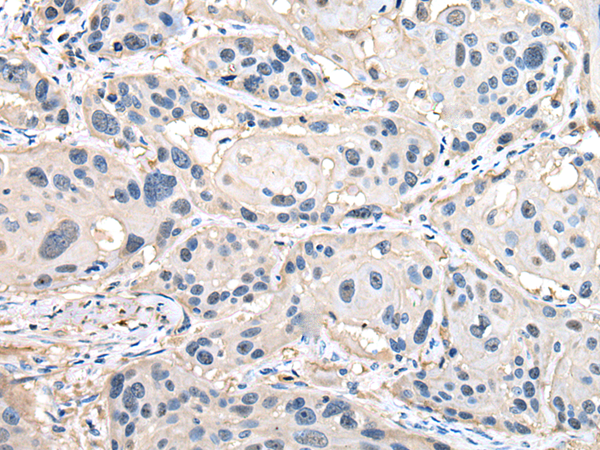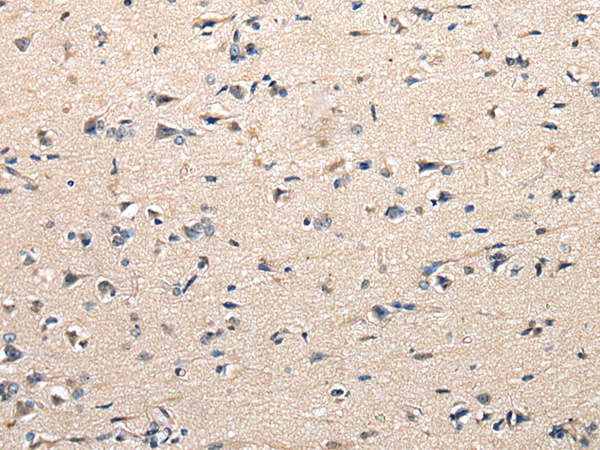

| WB | 咨询技术 | Human,Mouse,Rat |
| IF | 咨询技术 | Human,Mouse,Rat |
| IHC | 1/25-1/100 | Human,Mouse,Rat |
| ICC | 技术咨询 | Human,Mouse,Rat |
| FCM | 咨询技术 | Human,Mouse,Rat |
| Elisa | 1/5000-1/10000 | Human,Mouse,Rat |
| Aliases | HSP84; HSPC2; HSPCB; D6S182; HSP90B |
| Host/Isotype | Rabbit IgG |
| Antibody Type | Primary antibody |
| Storage | Store at 4°C short term. Aliquot and store at -20°C long term. Avoid freeze/thaw cycles. |
| Species Reactivity | Human, Mouse, Rat |
| Immunogen | Synthetic peptide of human HSP90AB1 |
| Formulation | Purified antibody in PBS with 0.05% sodium azide and 50% glycerol. |
+ +
以下是关于HSP90AB1抗体的模拟参考文献示例(建议通过PubMed或Google Scholar验证真实文献):
---
1. **文献名称**:*HSP90AB1 overexpression in colorectal cancer: association with clinicopathological features and prognosis*
**作者**:Zhang et al., 2020
**摘要**:通过免疫组化(IHC)和Western blot分析HSP90AB1在结直肠癌组织中的表达水平,发现其高表达与肿瘤分期和患者不良预后显著相关,提示其作为潜在生物标志物的价值。
2. **文献名称**:*HSP90AB1 interacts with AKT to promote tumor cell survival in breast cancer*
**作者**:Smith et al., 2018
**摘要**:利用HSP90AB1抗体进行免疫共沉淀(Co-IP)实验,证实其与AKT蛋白的直接相互作用,并发现抑制HSP90AB1可降低AKT磷酸化水平,从而抑制乳腺癌细胞增殖。
3. **文献名称**:*Neuroprotective role of HSP90AB1 in α-synuclein aggregation models*
**作者**:Lee et al., 2019
**摘要**:在帕金森病细胞模型中,使用HSP90AB1抗体阻断其功能,发现α-突触核蛋白聚集增加,表明HSP90AB1通过分子伴侣活性减少神经毒性蛋白沉积。
4. **文献名称**:*Targeting HSP90AB1 with 17-AAG enhances chemosensitivity in pancreatic cancer*
**作者**:Wang et al., 2021
**摘要**:通过Western blot和流式细胞术,研究HSP90抑制剂17-AAG与HSP90AB1抗体的协同作用,证明联合治疗可增强胰腺癌细胞对化疗药物的敏感性。
---
**注意**:以上为模拟示例,实际引用时请通过学术数据库检索并核实文献信息。
The HSP90AB1 antibody targets the heat shock protein 90 alpha family class B member 1 (HSP90AB1), a constitutively expressed cytosolic isoform of the HSP90 family. HSP90AB1. also known as HSP90-beta, is a molecular chaperone critical for maintaining cellular homeostasis by facilitating the folding, stabilization, and activation of client proteins, including kinases, transcription factors, and steroid hormone receptors. Unlike its stress-inducible counterpart HSP90AA1 (HSP90-alpha), HSP90AB1 is ubiquitously expressed under normal physiological conditions and plays a vital role in cellular processes such as signal transduction, protein trafficking, and stress adaptation.
Antibodies against HSP90AB1 are widely used in research to study its expression, localization, and interaction with client proteins or co-chaperones. They are essential tools in techniques like Western blotting, immunoprecipitation, and immunohistochemistry to investigate HSP90AB1's involvement in diseases, particularly cancer, neurodegenerative disorders, and infections. Overexpression of HSP90AB1 is observed in many cancers, where it supports oncogenic protein stability, making it a potential therapeutic target. Inhibitors of HSP90. such as geldanamycin derivatives, are being explored for anticancer therapies, though isoform-specific targeting remains challenging.
Additionally, HSP90AB1 antibodies aid in understanding its role in cellular stress responses and immune regulation, as extracellular HSP90 participates in antigen presentation and inflammatory signaling. These antibodies also help delineate functional differences between HSP90 isoforms, advancing insights into disease mechanisms and therapeutic strategies.
×